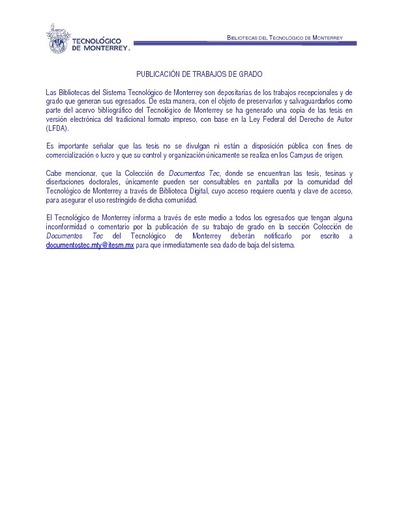| dc.contributor.advisor | McDaniel, Reuben | en |
| dc.creator | González Martínez, Martín J. | en |
| dc.date.accessioned | 2015-08-17T11:33:06Z | en |
| dc.date.available | 2015-08-17T11:33:06Z | en |
| dc.date.issued | 2008-06-01 | |
| dc.identifier.uri | http://hdl.handle.net/11285/572472 | en |
| dc.description.abstract | When an organization is examined as a Complex Adaptive System (CAS) one is able to suggest that they take information from environment, and use this information to adapt themselves and change their own behavior. The CAS study in Organizational Theory has revealed that systems must operate far from equilibrium; where, by both negative and positive feedback, they are driven to paradoxical states of stability and instability, predictability and unpredictability. Two commonly observed characteristics of complex systems are a large number of interacting elements and emergent properties. v A Campus Wide Information System can be defined as a set of interrelated components that collect or retrieve, process, store, and distribute information to support decision making and control in an University or College. Communications Systems theories emphasize there are two important elements of context, task and social influence. Most important is social influence, which affects perceptions of the task, the tools and their qualities, and their relevance to the task. Particularly when a communication medium is new, other peoples opinions cause a strong influence on new users. Use of Complex Adaptive Systems (CAS) Theory is helpful to understand the factors that might affect the rate of CWIS adoption, because it offers a solid base about the non-linear interactions between things, actors, and situation interlinked with. Deterministic theories, instead, try to use a rigid frame with chained trigger actions to comprehend complex relationships. | |
| dc.language | eng | |
| dc.publisher | Instituto Tecnológico y de Estudios Superiores de Monterrey | |
| dc.rights | info:eu-repo/semantics/openAccess | |
| dc.rights.uri | http://creativecommons.org/licenses/by-nc-nd/4.0 | * |
| dc.title | Rate of campus wide information systems adoption in novice users and its relationships with complex adaptive systems | en |
| dc.type | Tesis de doctorado | |
| thesis.degree.level | Doctor of Philosophy in Business Administration | en |
| dc.contributor.committeemember | Alanís Dávila, David Ángel | es |
| dc.contributor.committeemember | Gasperín Gasperín, Rafael Modesto de | es |
| thesis.degree.name | Doctoral Program in Administration | en |
| dc.subject.keyword | Wide Information Systems | en |
| dc.subject.keyword | Adoption in Novice Users | en |
| dc.subject.keyword | Complex Adaptive Systems | en |
| dc.subject.keyword | Campus | en |
| thesis.degree.program | Campus Monterrey | en |
| dc.subject.discipline | Negocios y Economía / Business & Economics | en |
| refterms.dateFOA | 2018-03-19T06:46:54Z | |
| refterms.dateFOA | 2018-03-19T06:46:54Z | |
| html.description.abstract | When an organization is examined as a Complex Adaptive System (CAS) one
is able to suggest that they take information from environment, and use this
information to adapt themselves and change their own behavior.
The CAS study in Organizational Theory has revealed that systems must
operate far from equilibrium; where, by both negative and positive feedback, they are
driven to paradoxical states of stability and instability, predictability and
unpredictability. Two commonly observed characteristics of complex systems are a
large number of interacting elements and emergent properties.
v
A Campus Wide Information System can be defined as a set of interrelated
components that collect or retrieve, process, store, and distribute information to
support decision making and control in an University or College. Communications
Systems theories emphasize there are two important elements of context, task and
social influence. Most important is social influence, which affects perceptions of the
task, the tools and their qualities, and their relevance to the task. Particularly when a
communication medium is new, other peoples opinions cause a strong influence on
new users.
Use of Complex Adaptive Systems (CAS) Theory is helpful to understand the
factors that might affect the rate of CWIS adoption, because it offers a solid base
about the non-linear interactions between things, actors, and situation interlinked
with. Deterministic theories, instead, try to use a rigid frame with chained trigger
actions to comprehend complex relationships. | |


